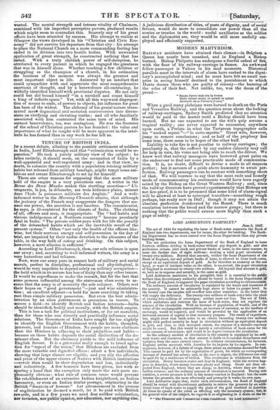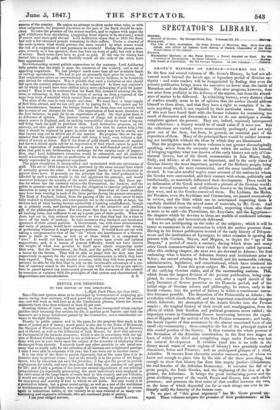LORD ASHBURTON'S PAMPHLET.*
June 8. 1847.
The act of 1844 for regulating the issue of Bank-notes separates the Bank of England into two departments, one for issues, the other for banking. The Bank- ing Department has no more control over the Issue Department than any private banking-house.
The act authorizes the Issue Department of the Bank of England to issue fourteen millions sterling in bank-notes without any deposit in gold; and also authorizes certain joint stock and private banks of issue in the same manner, to issue the further sum of eight millions: making a total pAper circulation of twenty-two millions. Beyond that amount, neither the Issue Department of the Bank of England, nor any private banks of issue, is allowed to issue bank-notes, except on an equivalent deposit of gold. As far therefore as economy on the one hand, or want of intrinsic value on the other, is concerned, the paper circulation of England is restricted to twenty-two millions. All beyond that amount is gold, or' both as to expense and security, is the same as gold. Lord Ashburton maintains in his pamphlet, that it is essential to the public welfare that discretionary authority should be vested in the Issue Department .alf the Bank of England, to augment the paper circulation according to circumstances. The ordinary amount of circulation is regulated by the wants and resources of the country. It cannot be arbitrarily kept above or below its proper level. In the former case the surplus will overflow into other countries: in the latter they will supply the deficiency. The twenty-two millions of bank-notes take the place of twenty-two millions of sovereigns: neither more nor less. The act of 1844, which authorizes and restricts the issue of bank-notes, does not regulate the amount of the circulation. With in increase of population, of wealth, and of the value of the exchangeable commodities, an increase of currency, as the medium of exchange, would be required, and would be provided by the application of an increased amount of capital to that necessary purpose. The result of experience, too, might show that bank-notes to an extent exceeding twenty-two millions might with perfect security be kept in circulation without an equivalent deposit in gold, and that, to that increased extent, the expense of a metallic currency might be saved. But this would be merely a substitution of bank-notes for the same amount of sovereigns; and would in no degree increase the circulation. As the ordinary amount of circulation in the country is regulated by its ordi- nary wants and resources, so that amount is liable to occasional disturbance and variation from the same natural causes. In ordinary circumstances, for instance, England settles accounts with America for its imports by its exports. In con- sequence, however, of a failure of crops, there arises an enormous demand for food. This cannot be paid for by the exportation of goods, for which no corresponding increase of demand has arisen; and, as the case is urgent" the difference can only be paid for by a remittance of bullion. This remittance -is withdrawn from the circulation. Money becomes scarce and dear in England; while the reverse hap- pens in America, where money becomes plenty and cheap. Goods are then ex- ported from England, where they are cheap, to America, where they are dear. bullion returns; and the ordinary amount of circulation is restored. During this curative, a severe pressure is felt in the money-market in England: but the more intense the pressure, the more effectually and promptly it works its own cure. Lord Ashburton urges that, under such circumstances, the Bank of England should be vested with discretionary authority to relieve the pressure by an addi- detail issue of bank-notes to supply the place of the gold rmnitted to America. At times he speaks of the crisis as affecting only the monetary system; but, in his general view of the subject, he regards it as originating in a drain on the re- 1." The Financial and Commercial Crisis Considered. By Lord Ashburton."
sources of the country. He makes no attempt to show under what rules, or with what safeguards, the proposed discretion on the part of the Bank should be exer- cised. To take the pressure off the money-market, and to replace with paper the gold withdrawn from circulation, (supposing these objects to be attained,) would of course send more gold abroad. Lord Ashburton states that in 1825 the Bank had only a few thousand pounds remaining in their coffers. Under a renewal of the same system, what would prevent the same result? by what means would the risk of a suspension of cash payments be averted? During the present pres- sure, severely as it has operated, there has been no want of gold, but only a want of money. Bank-notes have been as good as gold. If the run for money had turned into a run for gold, how fearfully would all the evils of the crisis have been aggravated!
- Notwithstanding several pettish expressions to the contrary, Lord Ashburton fully admits that the drain is upon the resources of the country, and is one of Appalling magnitude. We had pledged mach more than all our available funds on railway speculations. We had to pay an unusually high price for cotton. At that conjuncture arises an overwhelming call for twenty millions, to be forthwith sent abroad for subsistence. Was it possible that such a visitation as this should -fall upon the country otherwise than as a dire calamity? Is there any conjuror's art by which it could have been shifted into a mere exchanging of gold for paper- money ? Must it not be confessed that the Bank Bill, instead of creating the dis- tress, or enhancing it, has been the means of saving as from a renewal of the same long train of mischief which ensued from the measure of 1797? The state of the case is very simple and clear. We must have a large supply of food from abroad, and we can only get it by paying for it. We cannot pay for it in manufactures, because the foreign demand for them does not increase with the increase of our demand for food. The importation of food must, therefore, hi the first instance, be paid for by an exportation of gold. On that point there is no difference of opinion. The natural course of things left to itself will make money scarce in England, and, by making commodities cheap for want of buyets, will bring back the gold to purchase them. Lord Ashburton proposes, on the contrary, not that gold should not be exported, (for that he cannot help,) but that it should be replaced by paper, in order that money may not be scarce, and that buyers may not be driven out of the market. Be proposes this on the spe- culation that the surplus of gold abroad will bring it back, even without a defi- ciency of money at home. But if the drain of gold should continue—if another bad harvest should again call for an importation of food which cannot be paid for by an exportation ot manufactures—if a panic (a well-founded panic) should arise that gold is not forthcoming to exchange for the surplus issue of paper— then, alas! Lord Ashburton's resources would be exhausted, and all mankind would acknowledge that the via medicatrix of the natural remedy had been un- wisely superseded by an empirical expedient.
The paper circulation is incorporated and assimilated with the circulation of gold. The act of 1844 leaves it to be governed by the same natural laws which of necessity govern the other. It does not permit banks of issue to obstruct or pervert those laws. It proceeds on the principle that the relief professed to be afforded by such a course would in the end aggravate the pressure, and would moreover endanger the security of the whole monetary system. But those par- ties for whose use the currency exists—the Government, the bankers, and the public in general—are not absolved from the obligation to exercise judgment and discretion in using it in their respective dealings. Somewhat of these qualities may have been wanting in each of the three parties during the present emergency. The Bank of England, indeed, from the passing of the act, seem never to have fully realized to themselves, and consequently not to the community at large, the obvious fact of their having become exclusively a banking establishment, though on a princely scale, and having lost possession of the seductive and perilous gift of the philosopher's stone. For two years they kept a reserve in excess of all banking rules, and sufficient to eat up a great part of their profits. When the drain had set in, they reduced the reserve so low that they had for a time to leave off the trade of bankers. In both instances they betrayed and inculcated ignorance of their actual position. A Government, too, with more determination and unity of purpose, would have counted the cost, and prepared the means,
• of performing whatever it might propose to perform. It would have set out with taking a comprehensive view of the "ills" which the interference of a Govern- ment is liable to "cause, as well as of those which it is competent to "cure." It would not have acted by fits and starts upon crude and isolated suggestions; and, in a season of general difficulty, would not have thrown the weight of what was peculiar to itself upon others staggering under their own. But the Government, the Bank, and the public, will all three take a lesson for the future. They will be able to judge how far they may have • respectively to answer for the extent of the embarrassments to which they have been exposed. Thus, on any similar occasion, while they will from present ex- lelience be able for the first time to rely on the inestimable advantage of a sys- tem of currency sound to the heart's core, they will, each in the proper sphere, have to guard against any unnecessary pressure on the resources of the country by measures at variance with the principles of that system and characterized by

























 Previous page
Previous page